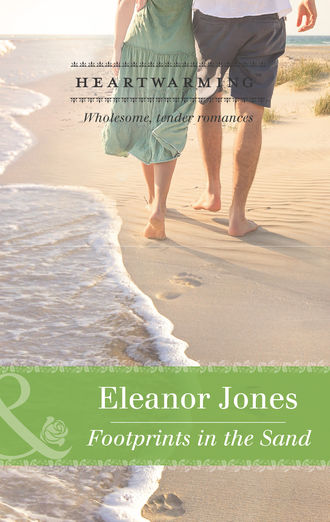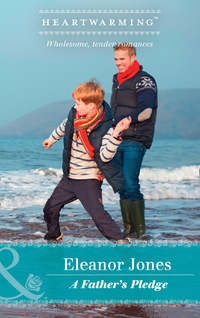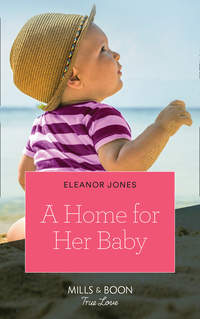
Полная версия
Footprints in the Sand
“Now, Mary,” he began. “Let’s not jump to...”
I didn’t find out what we shouldn’t jump to, though, for a gust of wind rushed through the house as the front door burst open. There was Mr. Mac. His stooped figure was outlined by sunshine, his white hair was all blown up into a funny shape and his mouth was working but no sounds were coming out. Clean salty air filled the room, the cries of gulls filled my head and I felt a great big sadness deep, deep down inside me. Perhaps the gulls were crying for my dad. Oh, how I wished he would come home.
“Is my dad back?” I cried, but Mr. Mac didn’t seem to hear me, then he stooped so far down that I thought he was going to fall.
Ted rushed over to help him across the small room and into his own chair by the fireside. I could tell by his face that the answer to my question was no, and so could Mrs. Mac. She seemed to have gone completely frozen now. I thought that perhaps she should get closer to the fire, too, and then she might go soft again; I liked her better when she was soft.
“Mick’s boat has been washed up on the rocks down the coast.”
Mr. Mac’s voice was so low and kind of croaky that it didn’t really sound like him at all, but I felt a great big jolt of excitement. My dad’s boat had been found! That must be good. But Ted’s eyes narrowed and I saw his jaw clench as he glanced across at me.
“Any sign of them?” His voice was low and urgent.
Mr. Mac’s face was very sad and he shook his head slowly from side to side.
“No one could have survived that storm...not even Mad Mick himself.”
I think I became invisible then because no one seemed to see me. Ted picked up his coat and headed for the door.
“I’ll go and see what I can find out,” he said. “And try not to worry.”
“Worry?” Mr. Mac murmured as the front door banged shut again. “It’s well beyond that.”
He turned to look at his wife, his eyes all wet and sad. “We’ve lost him, love,” he told her. “Our Daffyd’s gone.”
Suddenly she seemed to melt, crumpling onto the floor. But Mr. Mac didn’t go to help her; he just sat staring into space.
“There’s nothing left for us now,” he said
* * *
I DON’T KNOW HOW LONG we waited for someone to come. Mr. Mac didn’t seem able to get out of his chair and Mrs. Mac still lay on the floor, so I found a blanket and put it around her. It was a red-and-green checked blanket, her best one. I hoped she wouldn’t mind it being on the floor. Then I went and curled up next to the fire but it was getting lower so I tried to put on a log from the big brass box on the hearth. That only seemed to make it worse, though, so I decided to go and look for Ted.
The sun was so bright across the bay that I had to shade my eyes. It sparkled on the rippling water and glittered across the smooth expanse of sand, sand with no footprints at all. I searched along the shoreline but there was no sign of Ted anywhere, so I sat down and took off my shoes and socks. Sometimes, when my dad and me went for one of our walks along the beach, he would take off his shoes, too, and we would run together, right out to the edge of the sea. Now I looked down the coast to where I thought his boat might be and a big wave of loneliness stopped my breath. What if he never came back, what if we could never ever walk on the beach together again? I shook my head to get rid of the thought. My dad always came back.
I pretended he was right beside me as I stepped determinedly across the sand, feeling my bare toes dig deliciously into its crumbly surface. Ahead of me the sea glistened, a silver strip, way, way out near the sky, and I set off toward it, stopping sometimes to tread up and down until the sand beneath my feet went all soft and squishy. Then I had to jump out quickly in case it turned into quicksand and sucked me down forever. But the wet sand squelching between my toes made me feel much better, even though it was a bit cold.
I don’t know how I lost my shoes. A cloud rolled across the sun just as my feet got really cold, so I went to put them on but they were gone. I had walked almost to the edge of the sea and when I looked back to where our row of cottages nestled beneath the cliff they seemed a long way off, so I pretended to myself that my dad was right beside me as I walked back. However hard I tried, though, there was no one there, and my feet were becoming so numb that I couldn’t feel my toes at all. Eventually, when I just couldn’t walk anymore, I sat down on the huge stretch of lonely sand and started to cry.
I heard the siren blast out across the bay; an ear-splitting sound that brought me sharply to my senses. My dad had warned me about the tide so many times—“get off the sand when you hear that sound,” he used to say, and it felt to me as though he was right there speaking to me now, so I stood up again and began trudging toward the grassy shore.
I saw the white wave rushing at me around the other side of the bay. It didn’t look so dangerous, and anyway I could always swim. I was a good swimmer. I stared at it, mesmerized, wondering if I could outrun it. Fear prickled, my legs refused to work and then firm hands plucked me from the sand, swinging me high. My tears turned into a delighted shout—my dad had come to get me. I knew he’d never let me down.
“Now whatever are you doing out here all alone, lass?” came Ted’s voice. “And where are your shoes?”
A great loneliness welled up inside me, a pain that almost split my heart wide-open, and I went numb because suddenly I knew that my dad was gone forever.
I wanted Mrs. Mac, wanted to feel her plump arms enfold me, wanted her to hold me close against her big soft chest and wanted to hear her gentle voice telling me that everything was going to be all right.
“I want to go home,” I wailed as Ted swung me up to sit on his shoulders.
“And so you shall, little miss,” he promised, but his voice was flat and cold.
I clung tight to his forehead as he hurried across the sand, racing the water. It reached us just as he climbed the ledge onto the coarse grass of the shore, and then we were heading for the row of cottages that called me home.
* * *
MRS. MAC WAS SITTING IN A CHAIR now, but she still looked funny, not like Mrs. Mac at all. Ted said she had had “a bit of a turn,” but not to worry.
“It takes some people like that,” he told me in a quiet voice.
I could see he didn’t want her to hear so I whispered, too.
“Will she be better soon?”
Mr. Mac heard me. He looked up from his chair and his eyes were all misty and sad.
“We’ll never be better, lass,” he said, “for your father has lost our Daffyd.”
“Steady on now, Billy,” urged Ted. “She’s lost her father, too.”
Guilt hit hard, making everything inside me shrivel into a tight ball and I ran to the only comfort I knew. Mrs. Mac patted my head absentmindedly when I sank onto the floor, cradling her knees, but she didn’t pick me up.
“Go and get warmed up, lass.” Ted nodded at the dying embers of the fire. “Perhaps Mary will go find you some more shoes while I fill the coal bucket. The fire will be gone altogether if we don’t stoke it up a bit.”
Mrs. Mac just continued staring into space. “Elsa knows where they are,” she murmured. “She can get them herself.”
Her face was closed and gray, as if it belonged to someone else, and as I looked at her a big knot of sadness swelled and swelled inside me. Oh, why did my dad have to go away? If he hadn’t lost Daffyd, then Mrs. Mac would still be Mrs. Mac and I could sit on her knee and be cuddled. My knot of sadness hardened. I felt it grow tight inside me as I went next door to get my shoes, and by the time I came back it had turned into a solid lump. I felt cross with my dad and cross with the storm; in fact, I suppose I felt cross with the whole wide world. That night I put myself to bed, since no one else was going to. It felt lonely and cold in my bedroom at the top of our house and hunger pains gnawed at my stomach. I stared out into the darkness, trying not to cry as I watched the twinkling stars. Perhaps that was where my dad was, on a star. Or would he be an angel now?
Reality hit, melting the crossness that had helped to dull the pain, and I started to cry. I think I cried all night, until the dawn light filtered through my window, but there was no one to listen. I fell asleep eventually, and when I woke there was still no one there.
* * *
IT WAS TWO DAYS LATER before I dared to walk along the sand again. I had decided I would never go back there unless my dad came home, but the seagulls called out to me with such a haunting melody that I just had to go.
Mrs. Mac had managed to make some toast that morning. I put on my own butter and it dripped down onto my chin so that it felt all greasy. I rubbed it with my sleeve but that spread the grease all over my face. Mrs. Mac didn’t seem to notice. I went right up to her but she just stared at me as if I wasn’t there, and that was when I heard the seagulls calling and decided to go outside.
The tide was in today, covering the sand and almost lapping right up to our row of cottages. In some places, triangular chunks of the grass-covered shore had dropped into the water in huge lumps, so I shied away from the edge. My dad once told me that the sea was trying to eat up the land and if I wasn’t careful it would gobble me up, too. I stopped in my tracks. Now it seemed to me that he was the one who had been gobbled up. The sadness inside me swelled and I couldn’t find the lump of crossness that held it at bay. It was harder to find it when I was on my own, so I started walking again, very quickly, with the wind in my face. I thought that perhaps the wind would blow my sadness away.
It was where the grass gave way to a small sandy beach that I saw it, lying motionless on a bed of seashells, half in and half out of the sea. I stopped for a moment, shading my eyes with my hand to cut the glare of the sun on the water. It must be a seal, I thought, washed up by the tide. We’d had one of those in Jenny Brown’s Bay before. My heart began to race as I drew closer. It was too big to be a seal. A person, it had to be a person. Could it be...? Could it really be my dad, lying there on the shore? My heart beat very hard and the breath refused to leave my body, for my dad was lying there on the sand and I had to help him.
It wasn’t my dad, though, it was Daffyd; he had come home at last but it was too late. His face was so swollen and gray that he didn’t look like Daffyd at all. He looked like the seal we saw last year, cold and solid and empty. I hoped my dad wasn’t with him. I didn’t want my dad to look like that—ugly and dead.
Tears welled in my eyes but I found my crossness as I stared at poor Daffyd’s swollen face, turning my tears into anger again. And then I just ran and ran toward home, looking neither left nor right in case I saw my dad there, too. I didn’t want him to be like Daffyd. If my dad had to be dead, then I wanted him to be an angel because angels can look after you.
My dad never did come back to look after me.
CHAPTER FOUR
I DIDN’T GO TO DAFFYD’S funeral....
After I told everyone I’d found him, Mr. and Mrs. Mac, Ted and Sam the postman—he was the first person to know because I saw him as I ran toward our row of cottages—things went mad. I don’t think anyone really remembered about me after that.
They brought the coffin to the Macs’ cottage and it sat right there on the table. Shiny gleaming wood with curvy golden handles; it seemed a shame to me to put it in the ground. I saw it arrive from my hiding place behind Mrs. Mac’s blue sofa but I didn’t stay there for long. All I could think about was Daffyd, lying inside it, a solid gray swollen lump with a face that was Daffyd’s and yet nothing like Daffy at all. We used to laugh a lot, me and Daffyd. He called me his little sister. Now he would never laugh again.
I couldn’t find my crossness that day so I went to our cottage and curled up in a ball in my bedroom until I got too hungry to stay there. The bread in our kitchen was hard and moldy so I sneaked next door again. That was when I heard them.
The kitchen door was slightly ajar, so I peered through the crack to see Ted and Mrs. Mac. He had one hand on her shoulder and she was shaking all over.
“I can’t go on, Ted,” she said with tears in her voice.
He patted her awkwardly, as one would a dog.
“Now, come on, Mary, time heals all and there’s the child to think of.”
She looked up at him, her face all puffy and pale. Did everyone keep changing? I wondered. Did no one ever stay the same?
“But I can’t stand to see her, Ted,” she cried. “All I can see is Mad Mick’s eyes in her face, and I can’t forget what he’s done.”
“But she’s just a child, Mary.” Ted’s voice was very, very sad. “Then you take her, Ted,” she said in a low, angry tone. “I’ve got too much pain in me to care where she goes.”
I knew then that eventually they would send me away. It seemed that my world would keep on changing. But I liked having my dad’s eyes.
* * *
THE CHURCH MUSIC WAS heavy and slow. I thought Daffyd would have liked something much more jolly, for everyone to sing to. I sat behind a tall gravestone and waited for all the people to file into the church. I waited for my dad. If he was an angel now, then surely he would come to his friend Daffyd’s funeral.
He didn’t come that day, though, so when everyone came outside again, I headed home to sneak some cakes and sandwiches from the plates that were laid out in Mrs. Mac’s front room. It was the first time in days that I was able to eat my fill, and my stomach felt so sore that I climbed up the stairs to my own cold bedroom and finally slept.
I felt a bit better when I woke—the hunger pains no longer gnawed at my stomach—so I went next door to see if Mrs. Mac had changed back into herself yet.
I hadn’t really minded not having a mother up until then, for Mrs. Mac had always been like a mother to me. Now, when she looked at me with sad, vacant eyes, vague memories kept coming back, of glossy brown hair, a merry smile and the sweet scent of summer flowers—memories of the mother I hardly knew. She’d gone away, too. Perhaps it was my fault that everyone left.
My dad had been upset—I remember that. He yelled at her when she ran from the house in her high-heeled shoes. They went tippety-tap on the concrete path, then her laughter was lost in the roar of an engine. He cried when she’d gone, and I cried, too, because he was sad. I had Mrs. Mac, though, and my dad, so I soon forgot my mother. Suddenly it seemed as if she’d left just yesterday. Maybe she’d come back to look after me now. I asked Ted about it when he came to find me, but he shook his head slowly.
“Oh, Elsa,” he groaned. “You poor little mite.”
Was that what I was now, a poor little mite?
“What’s a mite, Ted?” I asked.
He lifted me up very high, swinging me around and around and laughing too loudly, but he didn’t answer my question.
“Let’s go see if Mrs. Mac will clean you,” he said. “You look as if you haven’t had a bath in days.”
I felt a bit better. Perhaps Ted would take care of me now.
* * *
I HAD ONLY JUST STARTED school that autumn. I liked my class and my teacher, Mrs. Meeks, and I liked learning things. But no one had told me to go to school since my dad went away. I wondered if I should go by myself, but I wasn’t sure of the way, so I took long walks on the shore instead.
Mrs. Mac ignored me most of the time, so I stopped trying to sit on her knee. She thought I had my father’s eyes and she didn’t like him anymore, so she must not like me, either. Sometimes she tried to be nice, but even when she spoke to me she never looked into my eyes. I searched for my lump of crossness when she did that, to hide the ache inside me that wouldn’t go away.
One day I heard her talking to Mr. Mac.
“The authorities will have to take her,” she said. “I can’t go on like this.”
That was when I decided to go and ask Ted if I could live with him.
A narrow lane led along the shore to our row of cottages, so close to the sea that in high tide the water lapped right up to it. Ted’s house was at the other end, higher up on a rocky incline. It was small and white with twinkling windows—a clean and friendly house, I thought, as I walked quickly toward its neat red door.
A slim blonde woman answered my knock. I had seen her before in the village with Ted, and she was at Daffyd’s funeral. Mrs. Mac called her “the city girl.” I don’t think she liked her very much.
“Hello,” she said in a high, bright voice. “I’m Victoria. How can I help you?”
My heart beat hard inside my chest.
“Is Ted here?”
Her face darkened and a shadow came into her pale eyes. “Ted’s busy, I’m afraid, Elsa.”
I stared at the floor, squirming as I realized that I was wearing mismatched shoes. I had forgotten that Ted had someone.
“I know Ted’s been watching out for you, but...well...”
Her eyes were kind but her whole body was tight and her mouth was a thin line.
“Look, dear...” Her words died out as his huge shape appeared behind her, towering over her slight frame. Now, I thought with a lurch of joy, everything would be all right.
“Come inside, lass,” he urged, but there was worry in his eyes, and he kept glancing down at Victoria’s smooth blond head as if he was afraid of her. That was a silly idea. How could anyone so big be afraid of someone so small?
She took hold of my arm—I wanted to pull away but I didn’t—and made me sit down on a sofa that was much too big for the cramped room. It was pale cream with pink flowers all over, and I’m sure it would have been soft and comfy if it hadn’t been covered in plastic.
“Would you like some lemonade?” she asked.
I shook my head and gritted my teeth, trying to say the words I had rehearsed. They wouldn’t come, though, so I sat quietly, twisting my feet together to hide my shoes.
Ted wasn’t like himself; he looked sad and distant.
Please don’t let him change, too, I said to myself, searching deep down for my lump of crossness so I wouldn’t cry. Why didn’t she go away and let me talk to Ted by myself?
“Ted,” she ordered, “come and help me make some tea.” Her voice was brittle, like a thin piece of glass. Then she turned to me with a bright, empty smile. “Are you sure you won’t have some lemonade, Elsa? Or we have orange juice?”
Ted grinned uneasily as he followed Victoria out of the room, but I just frowned.
I could hear their voices through a crack in the door. I pressed my ear up close to listen.
“You’ll have to tell her, Ted.”
Victoria spoke in the hushed whisper that all adults used when they didn’t want kids to hear, so I listened even harder, knowing they were about to say something bad.
“But what will she do? She has no one,” Ted argued. “She relies on me.”
“That’s not the point. The longer you leave it, the worse it’ll get and the more she’ll depend on you. She’ll be wanting to come live with us next.”
“Well...I suppose...”
Ted’s voice was wavering and I knew all was lost. It seemed that it was possible for a small person to be the boss of a big one after all. My crossness hardened into something sharp and painful.
“She needs proper care by people who know what they’re doing. Anyone can see the poor kid has problems. Frankly, I’m not surprised, living all alone with that Mad Mick Malone. The authorities will—”
I burst through the door, letting it bang against the wall, screaming as loudly as I could, so loudly that Ted’s face went white. Victoria gave him an “I told you so” look and pursed her lips. She reached out to grab me, but I broke free, sprinting from the house into the lonely comfort of the bay.
It was easy to get away from Ted—by the time he’d put on his shoes I was already way out along the shingle beach. I didn’t walk onto the sand, even though I really wanted to, because that would have left footprints for them to follow. I found a place behind an old wooden jetty where no one could see me.
If they sent me away from this place, I suddenly realized, there would never be any footprints to follow again. So if my dad came back, how could he ever find me? I would just lie down here on the shore, I decided, and go to sleep forever and ever. I squeezed my eyes shut and pressed my face into the sand.
I heard Ted’s feet running and I heard him shout but I ignored him, digging into the sand, listening to the seagulls and trying not to cry. When I opened my eyes again, a huge black-headed gull had landed close by, staring at me with beady yellow eyes. It stepped cautiously toward me, head leaning to one side, beak half-open.
“They want to send me away, bird,” I whispered.
It took a step closer and I reached out my hand.
“There you are,” Ted shouted.
The seagull, my friend, flapped its wings and flew off, and the crossness took over. I screamed and started to run, but Ted pinned me down.
“There, there, lass,” he murmured. “Let it all out.”
We sat like that for a very long time, until all my sobs were cried out. When they turned into whimpers and my tears dried, he tilted my chin and looked into my eyes.
“All everyone wants is the best for you, Elsa.”
I knew that wasn’t true. Mrs. Mac didn’t, and even if Ted did, Victoria wouldn’t let him.
“You have to be with people who can look after you properly,” he told me in a gentle voice.
“But when my dad comes back...” I began.
He shook his head slowly. “I’m sorry, Elsa, but they’ve found him. I’m afraid your dad will never come back to you now.”
CHAPTER FIVE
EIGHT-YEAR-OLD BRYN SNIFFED loudly and ran his nose across his sleeve, looking cautiously around to make sure that Mrs. Dibble hadn’t seen him. Mrs. Dibble was not impressed by children who forgot to use a tissue, and he didn’t want to miss out on ice cream for tea. They always had ice cream when a new child came.
All in all he didn’t really mind Mrs. Dibble. She ruled Appletree House with a rod of iron, but Bryn could usually get around her. Over the past three years he’d learned that a smile and a sorry went a long way. So did a pleasant smile, and it always helped settle in the new arrivals. The girl who was coming today, though, was supposed to have problems. He knew that because he’d overheard Mrs. Dibble and Sarah, the social worker, talking about her. They’d used words like traumatized, disturbed, hostile and antisocial.
Some of the children who came here were frightened and shy, and others were loud, rough and outspoken. “Gutterkids” he’d heard Mrs. Dibble call them. Disturbed and hostile were different kinds of words, though, and what exactly did traumatized mean? He wondered how old she was, imagining a teenager. Bryn liked to be responsible for helping the new kids settle in, but since he was only eight, maybe this time it wouldn’t be possible.
He headed for the door. It was hours until teatime so he might as well go play on the new swing in the oak tree that Bob, the gardener and handyman, had put there especially for him. Bryn had a way of getting people to do things like that.
* * *
FROM THE WINDOW OF HER office, Martha Dibble watched the little boy with the unruly dark hair and bright smile. She always tried not to get too involved with the children in her care, but with Bryn Evans it was difficult not to. He sniffed, wiping his nose on his sleeve, and she raised her eyebrows, knowing she should reprimand him. It was important to stay in control, as most of the children who came to Appletree were desperately lacking in parental guidance. She half rose and then sat down again, thinking better of it. If she took away Bryn’s ice cream, he’d look at her with those huge brown eyes, and with his ever-ready “sorry, Miss” he’d make her feel like the dragon they all said she was. Bryn ran off toward the garden and with a deep sigh she went back to the file she was reading. Maybe she was going soft in her old age. Of all the children who’d passed through Appletree over the past decade, Martha decided, narrowing her eyes to decipher the social worker’s scrawled handwriting, this child sounded as if she was going to be one of the worst. Words like hostile and emotionally disturbed painted a grim picture of a little girl who’d just turned six. Discipline and routine usually worked, though—Martha had found that they made children feel more secure. Lack of security was the root of most of their problems.









